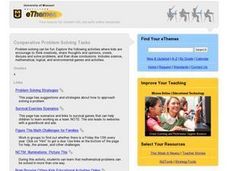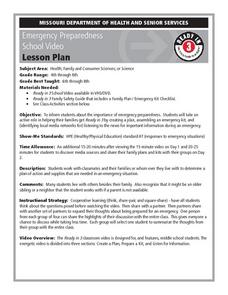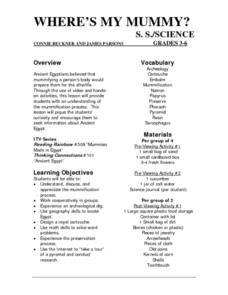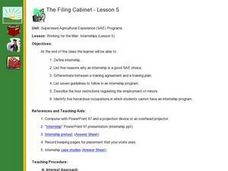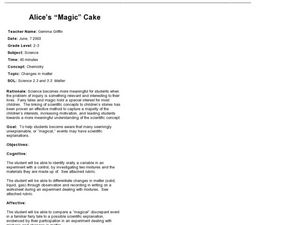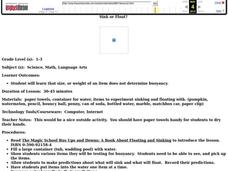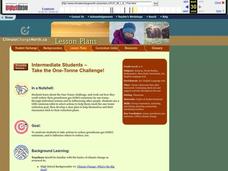Curated OER
Cooperative Problem Solving Tasks
Fourth graders explore the following activities where kids are encourage to think creatively, share thoughts and opinions, create, discuss and solve problems, and than draw conclusions.
Curated OER
Agriculture Awareness Through Poetry
Whether you are viewing a landscape painting of a farm, examining a still-life portrait of a bowl of fruit, or reading a descriptive poem about cultivating food, you can't deny that agriculture plays a major role in visual and language...
Curated OER
Visit To the Farm
Students research farm animals and write a story based on the research.
Curated OER
Plants, Ecology, Seed Planting
First graders use senses to examine objective or events, then gather and interpret data with instruments. They design invention to support or refute hypothesis, then generate, record, and organize data. They improve environmental...
Curated OER
Testing the Accuracy of a Rain Gauge
Students identify and test variables that may affect the accuracy of a rain gauge. They share findings of their research with the class in a 'mini-meteorology-convention'. They design an experiment with a control setup to test their...
Curated OER
Family Emergency Preparedness
Students watch a video prior to developing a family emergency preparedness plan and kit. They decide with their families what local media sources they would use to get information during an emergency situation.
Curated OER
"If you build it..."
Students utilize prior knowledge to erect and assemble a building from a drawing using spaghetti noodles and marshmallows. In this building lesson, students visualize a three dimensional structure from looking at a picture and converting...
Curated OER
Shake, Rattle, and Roll
Students make an earthquake simulator and test their structure to see if it lasts through the earthquake. In this earthquake lesson plan, students make a structure and test and record the results from an earthquake simulator made out of...
Curated OER
MAISA and the REMC Association of Michigan
Students complete online research to study geography's impact on weather. In this geography and weather lesson, students research weather in their city for ten days using an online website. Students bookmark the site, enter data into a...
Curated OER
Shorts in January? Is Climate Change Good for Us?
Students explore climate change and the idea that it brings a number of uncertainties about how regions are affected, particularly in the north. Students discuss the advantages and disadvantages that climate change may have for them....
Curated OER
Use of the Forest in the Economic Evolution of Oakville, Pennsylvania
Students explore forest usage and the ways which it affected the development of Oakville. They identify the technological advances that shaped forest based industries, and the current challenges facing the community of Oakville.
Curated OER
Designing an Ecologically Sound City
Fifth graders design an "ecologically sound" city. They write laws for the city to help make all citizens aware of their ecological responsibilities and propose alternative power sources for light and heat.
Curated OER
Where's My Mummy: Preservation Techniques
To observe preservation techniques firsthand, learners dry a flower in sand and compare cucumber slices soaked in salt water for a week with slices left out to dry in the open air. Video resources (not attached) include one about mummies...
Curated OER
Endangered Animals Books
Middle schoolers research endangered species and create and publish books to present their findings. Designed to use Inspiration software, this resource could be adapted if you don't have access to the program. Contains handy website...
Curated OER
Bubble-ology
Learners observe the visible spectrum while observing light hitting the surface of bubbles. They blow large bubbles and observe how the colors change.
Curated OER
El Salvador: How Can My Breakfast Harm the Birds?
Sixth graders explore how their food choices can have an impact on the rain forests. They examine coffee farming and how their techniques can harm birds in the rain forest. Students design two farms with sustainability of bird habits in...
Curated OER
LAND USE DEBATE / TOWN MEETING
Ninth graders research, analyze, and orally defend an issue related to the use of geologic resources. They defend their position in written form by composing a letter to an appropriate source.
Curated OER
Working for the Man: Internships
Students define internship and list five reasons why an internship is a good SAE choice. They differentiate between a training agreement and a training plan and list seven guidelines to follow when in an internship program. Finally,...
Curated OER
Friction: Friend or Foe?
Using a hands-on approach, learners explore the effect of friction on objects. Learners use toy cars, shoes, wood, metal, and more to experiment with the causes and effects of friction. Afterwards, they conduct experiments in which they...
Curated OER
Dinosaurs
Students are introduced to the various types of dinosaurs and write in their journals about their favorite one. After listening to a story and watching a filmstrip, they color a few pages in their Dinosaur Friends Book. They also examine...
Curated OER
Alice Magic Cake
Using a famous children's story as the hook, learners explore the concept of changes in matter. First, they make a cake similar to the one made by Alice in the story Alice's Adventure in Wonderland by Lewis Carroll. Next, they let their...
Curated OER
Sink or Float?
Students predict and test different items to see if they sink or float. In this sink and float lesson plan, students predict whether an item is buoyant or not, and learn that size and weight do not matter when it comes to buoyancy.
Curated OER
What's the Difference?
Young scholars analyze the similarities in different species. This instructional activity is part of a multi-segmented unit on the diversity of life. In this segment, students classify shoes to mimic the scientific categories of the...
Curated OER
Take the One-Tonne Challenge!
Learners investigate the One-Tonne challenge, and work out how they could reduce their greenhouse gas (GHG) emissions by one tonne, through individual actions and by influencing other people.


